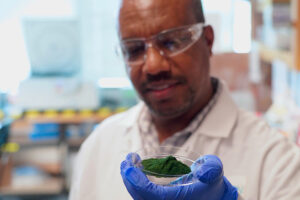
A pinch of enzyme magic in the daily diet of cows might just be the secret ingredient to a cooler, more sustainable planet. The U’s Wilkes Center for Climate Science & Policy recently awarded a $1.5 million climate prize to a project that developed enzymes with the potential to significantly reduce the climate-damaging methane that cattle burp.
“It’s perfect for the Wilkes Climate Prize at the University of Utah—we want to supercharge a credible, ambitious idea that may be too risky for traditional funding sources,” shares William Anderegg, associate professor of biology and director of the Wilkes Center. “The technology is patented, it works in the lab, and now, it’s time to scale it up.”
Methane might not be as well-known as CO₂, but it’s a silent and potent contributor to our warming planet, with a whopping 80 times more warming power over a 20-year period. It also doesn’t linger as long as CO₂, meaning cutting methane emissions could cool our atmosphere more quickly. A quarter of today’s global warming is attributed to methane from human activities, primarily agriculture, with livestock being the largest agricultural source.
The awarded project, born from the minds of scientists who discovered how to genetically engineer the edible algae spirulina, extends its approach to target methane-producing microorganisms in the rumen, a specialized compartment of cattle’s gastrointestinal tracts. The spirulina is engineered to produce an enzyme protein that destroys methanogens, the microbes responsible for methane production in the rumen, without affecting the cattle or their other beneficial bacteria.
The enzyme is so effective that a tiny addition to a cow’s diet could make them methanogen-free. The prize money will be used to enhance the enzyme mixture, evaluate its safety and efficacy in cattle, determine optimal dosage, and validate large-scale outdoor production methods.
The Wilkes Climate Prize at the U is one of the largest university-affiliated climate prizes in the world and aims to push through potential breakthroughs with a one-time, unrestricted cash award.



Comments
Comments are moderated, so there may be a slight delay. Those that are off-topic or deemed inappropriate may not be posted. Your email address will not be published. Required fields are marked with an asterisk (*).